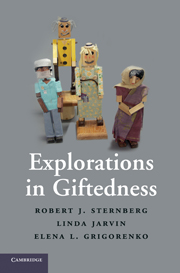Book contents
- Frontmatter
- Contents
- Preface
- 1 What Is Giftedness?
- 2 Theories of Giftedness
- 3 WICS as a Model of Giftedness
- 4 Intelligence and Giftedness
- 5 Creativity and Giftedness
- 6 Wisdom and Giftedness
- 7 Giftedness as Developing Expertise
- 8 Giftedness and Culture
- 9 Learning Disabilities, Giftedness, and Gifted/LD
- 10 Identifying the Gifted
- 11 Educating the Gifted
- References
- Index
3 - WICS as a Model of Giftedness
Published online by Cambridge University Press: 05 June 2012
- Frontmatter
- Contents
- Preface
- 1 What Is Giftedness?
- 2 Theories of Giftedness
- 3 WICS as a Model of Giftedness
- 4 Intelligence and Giftedness
- 5 Creativity and Giftedness
- 6 Wisdom and Giftedness
- 7 Giftedness as Developing Expertise
- 8 Giftedness and Culture
- 9 Learning Disabilities, Giftedness, and Gifted/LD
- 10 Identifying the Gifted
- 11 Educating the Gifted
- References
- Index
Summary
When schools identify children as gifted in one or more domains, they often focus on what the children know about the domain (school achievement) and the children's ability to learn about that domain more rapidly or more thoroughly than do other individuals (school aptitudes). But gifted adults are usually identified in terms of the leadership roles they take in their fields, not in terms of how quickly they learned about their fields. For example, Mozart was a leading composer in the sense that other musicians came to follow his mode of composition, and musicians came to play his music; Picasso's style as an artist has been imitated by many followers, and other followers have simply admired that style. Great political leaders compare their leadership style to that of greater leaders, such as Lincoln or Roosevelt.
The goal of this chapter is to argue that giftedness is, in large part, a function of creativity in generating ideas, analytical intelligence in evaluating the quality of these ideas, practical intelligence in implementing the ideas and convincing others to value and follow the ideas, and wisdom to ensure that the decisions and their implementation are for the common good of all stakeholders. The model is referred to as WICS – wisdom, intelligence, creativity, synthesized – although the order of elements in the acronym is intended only to make it pronounceable (Sternberg, 2003c, 2003d, 2005c, 2005d).
- Type
- Chapter
- Information
- Explorations in Giftedness , pp. 34 - 53Publisher: Cambridge University PressPrint publication year: 2010



